
Galija is a Serbian and Yugoslav rock band formed in Niš in 1977.

Nenad Milosavljević, also known as Neša Galija, is a Serbian musician and politician, best known as the frontman of the Serbian and former Yugoslav rock band Galija. He is the brother of Galija vocalist and lyricist Predrag Milosavljević. Nenad Milosavljević is a member of Socialist Party of Serbia, and is a former deputy in the National Assembly of Serbia.
"Ona to zna" is the fourth and last single by Serbian band Idoli. The single was given as a present with Džuboks magazine issue. The song appeared on the Šest dana juna soundtrack album. A live version of the song appeared on the Vlada Divljan live album Odbrana i zaštita.

Sve što vidim i sve što znam is the third album by the Serbian rock band Bjesovi, released in 1997.

Letim, sanjam, dišem is the sixth studio album by Serbian/Yugoslavian new wave band Električni orgazam. It was released in 1988 by PGP RTB.

Prva plovidba is the debut studio album from Serbian and former Yugoslav rock band Galija.

Druga plovidba is the second studio album from Serbian and former Yugoslav rock band Galija.
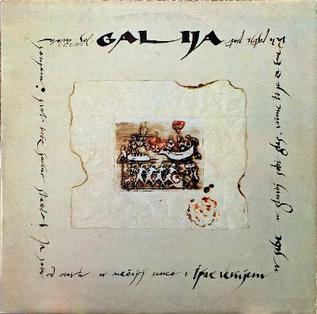
Ipak verujem u sebe is the third studio album from Serbian and former Yugoslav rock band Galija.

Bez naglih skokova is the fourth studio album from Serbian and former Yugoslav rock band Galija.

Digni ruku is the fifth studio album from Serbian and former Yugoslav rock band Galija.
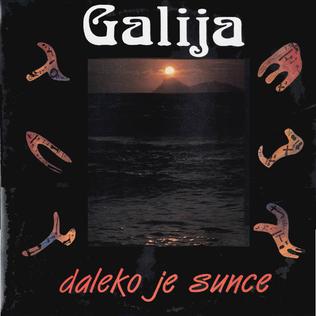
Daleko je Sunce is the sixth studio album from Serbian and former Yugoslav rock band Galija. It is the first part of the trilogy consisting of this album, the album Korak do slobode and the album Istorija, ti i ja.

Korak do slobode is the seventh studio album from Serbian and former Yugoslav rock band Galija. It is the second part of the trilogy consisting of the album Daleko je Sunce, this album and the album Istorija, ti i ja. It is the second album recorded in cooperation with lyricist Radomir Kanjevac.

Istorija, ti i ja is the eighth studio album from Serbian and former Yugoslav rock band Galija. It is the third and the final part of the trilogy consisting of the album Daleko je Sunce, the album Korak do slobode and this album. It is the third album recorded in cooperation with lyricist Radoman Kanjevac.

Jednom u sto godina is a 7-inch single release by Serbian and former Yugoslav rock band Galija. The release features a cover of Film song "Mi nismo sami" and a cover of Indexi song "Sanjam", the songs being the only covers ever recorded by Galija. Jednom u sto godina was released as a part of celebration of one hundred years of existence of the publishing house Serbian Literary Guild, and the release cover resembles the covers of books published by the Serbian Literary Guild. Jednom u sto godina was given as a gift to the visitors of Galija koncert in Sava Centar held on December 25, 1992.
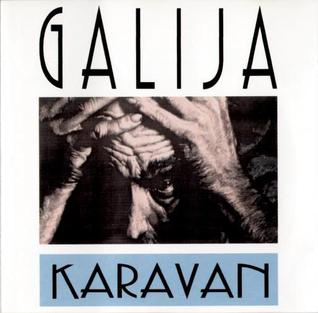
Karavan is the ninth studio album from Serbian and former Yugoslav rock band Galija. Karavan is the last album that was recorded in cooperation with the lyricist Radoman Kanjevac.

Voleti voleti is the eleventh studio album from Serbian and former Yugoslav rock band Galija.
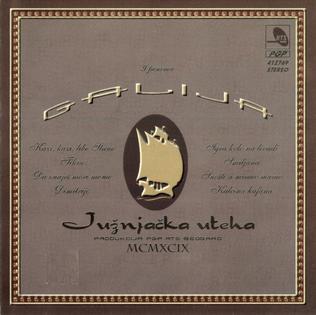
Južnjača uteha is the twelfth studio album from Serbian and former Yugoslav rock band Galija, released in 1999. The album features covers of Serbian traditional songs. The only song which is not a cover is the song "Uteha", written by Nenad Milosavljević and Dragutin Jakovljević.
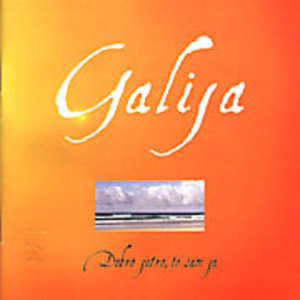
Dobro jutro, to sam ja is the thirteenth studio album from Serbian and former Yugoslav rock band Galija, released in 2005.

Mesto pored prozora is the fourteenth studio album from Serbian rock band Galija, released in 2010.

San was a Yugoslav rock band formed in Belgrade in 1971. San was formed by the composer Aleksandar "Sanja" Ilić. It disbanded in 1975, after the band's vocalist Predrag Jovičić died in concert from an electric shock.












